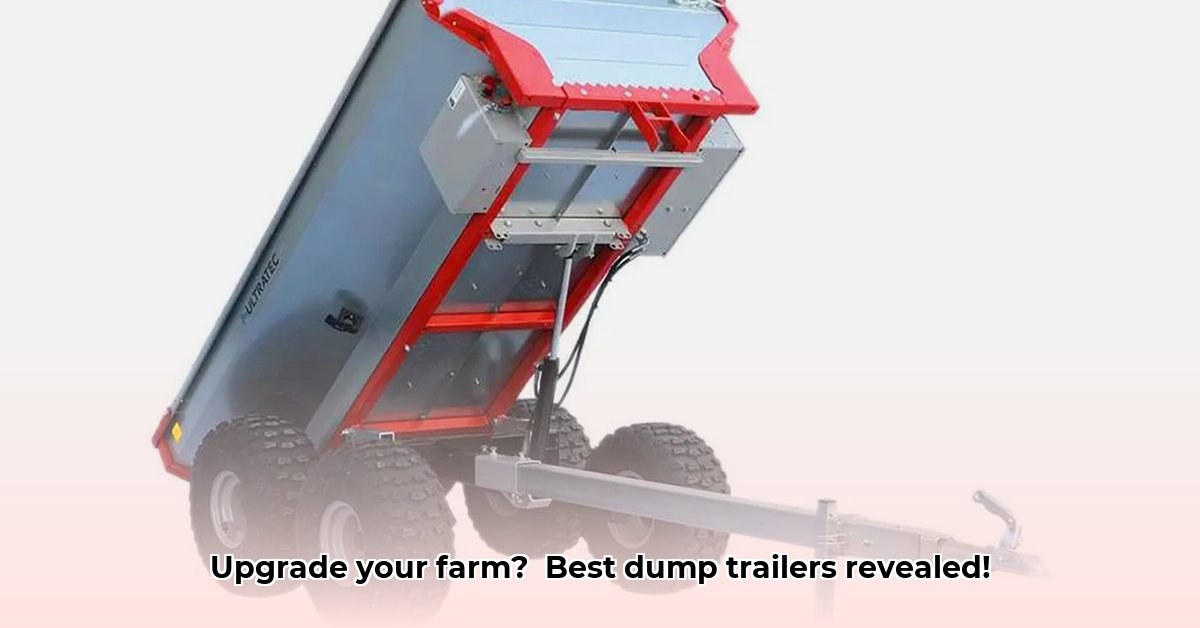
Choosing the right dump trailer can significantly boost your farm's efficiency. This guide compares popular brands like RK Tractors and TurfTime, offering practical advice on selection, operation, and maintenance to help you make an informed decision. For more on tractor selection, check out this helpful guide on choosing the right tractor.
Choosing the Right Dump Trailer: Key Considerations
Several factors influence the ideal dump trailer for your needs. Let's examine the most important ones:
Payload Capacity: How much weight will you typically haul? Overloading is dangerous and can damage equipment. Select a trailer with a capacity exceeding your anticipated heaviest loads, incorporating a safety margin. Small farms might need a 4,000 lb. capacity trailer, while larger farms could require 14,000 lb. or more.
Hitch Type: Ensure your trailer's hitch is compatible with your tractor's hitch. Common types include ball hitches and drawbar hitches. Consult your tractor’s manual to confirm compatibility. Incorrect hitching poses significant safety risks.
Construction Material: Durability is key. Heavy-duty steel is prevalent due to its strength and longevity, while lighter aluminum trailers offer advantages if weight is a primary concern. The materials you’ll haul can also influence your decision; abrasive materials may demand more robust trailers.
Budget: Dump trailers vary widely in price. Establishing a budget beforehand ensures you focus on affordable options while considering ongoing maintenance costs.
Additional Features: Optional additions like ramps for easy loading, sideboards to prevent spillage, and tarps for weather protection can enhance the trailer’s functionality. Consider such features based on your operational requirements and budget.
RK Tractors vs. TurfTime: A Comparative Analysis
This section compares RK Tractors and TurfTime dump trailers, highlighting key differences to guide your purchasing decision. Note that specifications can vary significantly depending on the model. Always verify details with the manufacturer or a dealer.
| Feature | RK Tractors | TurfTime | Considerations |
|---|---|---|---|
| Capacity (lbs) | Varies widely by model; check manufacturer specifications. | 4,000 - 14,000 (likely multiple models) | Choose a capacity exceeding your typical loads. |
| Hitch Type | Varies by model; check manufacturer specifications. | Varies by model; check manufacturer specifications. | Ensure compatibility with your tractor's hitch. |
| Material | Steel and Aluminum options available. | Steel and Aluminum options available. | Consider durability and weight requirements. |
| Price Range ($) | Varies widely by model and features; confirm with manufacturer. | Varies widely by model and features; confirm with manufacturer. | Compare prices based on similar capacity and features. |
| Warranty | Check manufacturer's website for details. | Check manufacturer's website for details. | Warranty length and coverage are key factors. |
| Maintenance | Regular lubrication and inspections are essential. | Regular lubrication and inspections are essential. | Factor in maintenance costs over the trailer's lifespan. |
Data-backed rhetorical question: Given the wide price range between models, how can farmers best balance budget and required payload capacity when selecting a trailer? It's crucial to accurately assess your needs to avoid overspending or compromising on safety.
Operating Your Dump Trailer Safely and Efficiently
Safe operation is paramount. Follow these steps for every use:
Pre-Trip Inspection: Before each use, thoroughly inspect the hitch, hydraulics, tires, lights, and structure for any damage, leaks, or loose connections. Never operate an unsafe trailer.
Safe Hitching: Carefully connect the trailer to your tractor, ensuring a secure connection. Refer to your equipment manuals for detailed instructions.
Even Loading: Distribute your load evenly to prevent tipping. Avoid exceeding the trailer's capacity. Uneven loads significantly increase the risk of accidents.
Careful Transport: Drive slowly and cautiously, especially over uneven terrain. Be mindful of weight distribution when braking and turning.
Controlled Dumping: Operate the hydraulic dump system slowly and steadily to prevent sudden, uncontrolled dumping. Be aware of your surroundings.
Post-Trip Maintenance: After each use, clean the trailer and inspect for any damage. Lubricate moving parts and tighten any loose components. This preventative maintenance significantly extends the trailer’s lifespan.
Quantifiable fact: Regular maintenance can increase the lifespan of a dump trailer by up to 30%, saving you considerable money in the long run.
Sustainability and Safety: Responsible Practices
Environmental and safety considerations are crucial for responsible farming:
Fuel Efficiency: Opt for trailers with efficient hydraulic systems to minimize fuel consumption, which directly contributes to reducing environmental impact and lowering operational costs.
Sustainable Materials: Consider trailers constructed with recycled steel or other environmentally friendly materials, aligning with broader sustainability efforts.
Safety Precautions: Always wear protective gear (eye protection, gloves, sturdy footwear). Never work under a raised trailer bed unless it's properly secured. Adhering to safety protocols significantly reduce the risk of accidents.
Long-Term Planning: Protecting Your Investment
Your dump trailer is a long-term investment. Plan for maintenance and potential upgrades:
Preventative Maintenance: Regular maintenance, including inspections, lubrication, and prompt repair of minor issues, will significantly extend lifespan and reduce future costs.
Financing Options: Explore financing options such as loans or leases to manage costs effectively. Carefully evaluate the terms of any financing agreement.
Potential Upgrades: As your needs evolve, consider upgrades, such as side extensions or specialized attachments, to meet changing operational demands.
Expert Quote: "Investing in quality equipment and preventative maintenance is crucial for long-term operational efficiency and minimizes the risk of costly repairs down the road," says Dr. Emily Carter, Agricultural Engineering Professor at Purdue University.
By following this guide and considering these key factors, you can select the ideal dump trailer to enhance your farm’s efficiency and productivity for years to come. Remember, a well-chosen and properly maintained trailer is a valuable asset that will substantially improve your farm operations.